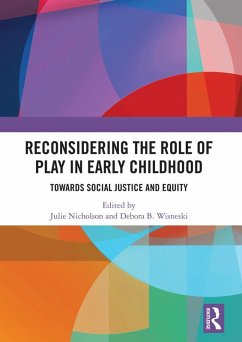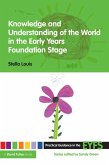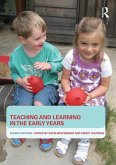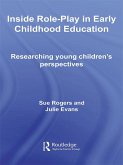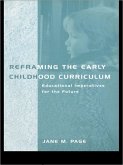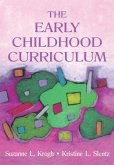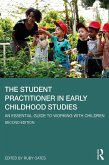Reconsidering The Role of Play in Early Childhood (eBook, ePUB)
Towards Social Justice and Equity
Redaktion: Nicholson, Julie M.; Wisneski, Debora B.
41,95 €
41,95 €
inkl. MwSt.
Sofort per Download lieferbar

21 °P sammeln
41,95 €
Als Download kaufen

41,95 €
inkl. MwSt.
Sofort per Download lieferbar

21 °P sammeln
Jetzt verschenken
Alle Infos zum eBook verschenken
41,95 €
inkl. MwSt.
Sofort per Download lieferbar
Alle Infos zum eBook verschenken

21 °P sammeln
Reconsidering The Role of Play in Early Childhood (eBook, ePUB)
Towards Social Justice and Equity
Redaktion: Nicholson, Julie M.; Wisneski, Debora B.
- Format: ePub
- Merkliste
- Auf die Merkliste
- Bewerten Bewerten
- Teilen
- Produkt teilen
- Produkterinnerung
- Produkterinnerung

Bitte loggen Sie sich zunächst in Ihr Kundenkonto ein oder registrieren Sie sich bei
bücher.de, um das eBook-Abo tolino select nutzen zu können.
Hier können Sie sich einloggen
Hier können Sie sich einloggen
Sie sind bereits eingeloggt. Klicken Sie auf 2. tolino select Abo, um fortzufahren.

Bitte loggen Sie sich zunächst in Ihr Kundenkonto ein oder registrieren Sie sich bei bücher.de, um das eBook-Abo tolino select nutzen zu können.
Reconsidering the Role of Play in Early Childhood is a corpus of global play research in early childhood education; aiming to show the experiences of the marginalized. The book tests researchers and practitioners to re-consider play through multiple lenses. This book was originally published as a special issue of Early Child Development and Care.
- Geräte: eReader
- ohne Kopierschutz
- eBook Hilfe
- Größe: 2.76MB
Andere Kunden interessierten sich auch für
![Knowledge and Understanding of the World in the Early Years Foundation Stage (eBook, ePUB) Knowledge and Understanding of the World in the Early Years Foundation Stage (eBook, ePUB)]() Stella LouisKnowledge and Understanding of the World in the Early Years Foundation Stage (eBook, ePUB)29,95 €
Stella LouisKnowledge and Understanding of the World in the Early Years Foundation Stage (eBook, ePUB)29,95 €![Teaching and Learning in the Early Years (eBook, ePUB) Teaching and Learning in the Early Years (eBook, ePUB)]() Teaching and Learning in the Early Years (eBook, ePUB)45,95 €
Teaching and Learning in the Early Years (eBook, ePUB)45,95 €![Inside Role-Play in Early Childhood Education (eBook, ePUB) Inside Role-Play in Early Childhood Education (eBook, ePUB)]() Sue RogersInside Role-Play in Early Childhood Education (eBook, ePUB)46,95 €
Sue RogersInside Role-Play in Early Childhood Education (eBook, ePUB)46,95 €![Reframing the Early Childhood Curriculum (eBook, ePUB) Reframing the Early Childhood Curriculum (eBook, ePUB)]() Jane PageReframing the Early Childhood Curriculum (eBook, ePUB)50,95 €
Jane PageReframing the Early Childhood Curriculum (eBook, ePUB)50,95 €![Rethinking Play and Pedagogy in Early Childhood Education (eBook, ePUB) Rethinking Play and Pedagogy in Early Childhood Education (eBook, ePUB)]() Rethinking Play and Pedagogy in Early Childhood Education (eBook, ePUB)45,95 €
Rethinking Play and Pedagogy in Early Childhood Education (eBook, ePUB)45,95 €![The Early Childhood Curriculum (eBook, ePUB) The Early Childhood Curriculum (eBook, ePUB)]() Suzanne KroghThe Early Childhood Curriculum (eBook, ePUB)42,95 €
Suzanne KroghThe Early Childhood Curriculum (eBook, ePUB)42,95 €![The Student Practitioner in Early Childhood Studies (eBook, ePUB) The Student Practitioner in Early Childhood Studies (eBook, ePUB)]() The Student Practitioner in Early Childhood Studies (eBook, ePUB)34,95 €
The Student Practitioner in Early Childhood Studies (eBook, ePUB)34,95 €-
-
-
Reconsidering the Role of Play in Early Childhood is a corpus of global play research in early childhood education; aiming to show the experiences of the marginalized. The book tests researchers and practitioners to re-consider play through multiple lenses. This book was originally published as a special issue of Early Child Development and Care.
Dieser Download kann aus rechtlichen Gründen nur mit Rechnungsadresse in A, B, BG, CY, CZ, D, DK, EW, E, FIN, F, GR, HR, H, IRL, I, LT, L, LR, M, NL, PL, P, R, S, SLO, SK ausgeliefert werden.
Produktdetails
- Produktdetails
- Verlag: Taylor & Francis eBooks
- Seitenzahl: 320
- Erscheinungstermin: 11. Mai 2020
- Englisch
- ISBN-13: 9780429769993
- Artikelnr.: 59427922
- Verlag: Taylor & Francis eBooks
- Seitenzahl: 320
- Erscheinungstermin: 11. Mai 2020
- Englisch
- ISBN-13: 9780429769993
- Artikelnr.: 59427922
- Herstellerkennzeichnung Die Herstellerinformationen sind derzeit nicht verfügbar.
Julie Nicholson is Associate Professor of Practice at Mills College, Oakland, USA and the Director of the Center for Play Research. She is also the Deputy Director for WestEd's Center for Child and Family Studies. Debora Basler Wisneski is the John T. Langan Community Chair in Early Childhood Education at the University of Nebraska Omaha, USA and the Director of the Early Childhood Inclusive Program.
Foreword: Is play a privilege or a right? And what's our responsibility? On
the role of play for equity in early childhood education Introduction Part
I: Potential and troubles of play in teaching and learning 1. Block play:
spatial language with preschool and school-aged children 2. Early childhood
curriculum development: the role of play in building self-regulatory
capacity in young children 3. Understanding and supporting block play:
Video observation research on preschoolers' block play to identify features
associated with the development of abstract thinking 4. The relative
emphasis of play rules between experienced and trainee caregivers of
toddlers 5. Influencing factors on professional attitudes towards
risk-taking in children's play: a narrative review 6. Follow the leader:
attending to the curriculum making potential of pre-schoolers Part II:
Children's agency and play 7. Playing at violence: lock-down drills, 'bad
guys' and the construction of 'acceptable' play in early childhood 8. Where
is my stuff? Conceptualizing Hip Hop as 'play' 9. They're lovin' it: how
preschool children mediated their funds of knowledge into dramatic play
10. Civic action and play: examples from Maori, Aboriginal Australian and
Latino communities 11. Rethinking young children's digital game play
outside of the home as a means of coping with modern life Part III:
Troubling spaces for play 12. Playing with power: an outdoor classroom
exploration 13. Where do the children play?: An investigation of the
intersection of nature, early childhood education and play 14. Sandboxes,
loose parts, and playground equipment: a descriptive exploration of outdoor
play environments 15. 'They get enough of play at home': a Bakhtinian
interpretation of the dialogic space of public school preschool 16. Rooms
with gender: physical environment and play culture in kindergarten Part IV:
Expanding play perspectives 17. Children's engagement in play at home: a
parent's role in supporting play opportunities during early childhood 18.
Parents' perceptions of play: a comparative study of spousal perspectives
19. The social kindergartener: comparing children's perspectives of full-
and half-day kindergarten 20. Interpersonal fields of play 21. The Black
baby doll doesn't fit the disconnect between early childhood diversity
policy, early childhood educator practice, and children's play 22. Using
cross-cultural conversations to contextualize understandings of play: a
multinational study
the role of play for equity in early childhood education Introduction Part
I: Potential and troubles of play in teaching and learning 1. Block play:
spatial language with preschool and school-aged children 2. Early childhood
curriculum development: the role of play in building self-regulatory
capacity in young children 3. Understanding and supporting block play:
Video observation research on preschoolers' block play to identify features
associated with the development of abstract thinking 4. The relative
emphasis of play rules between experienced and trainee caregivers of
toddlers 5. Influencing factors on professional attitudes towards
risk-taking in children's play: a narrative review 6. Follow the leader:
attending to the curriculum making potential of pre-schoolers Part II:
Children's agency and play 7. Playing at violence: lock-down drills, 'bad
guys' and the construction of 'acceptable' play in early childhood 8. Where
is my stuff? Conceptualizing Hip Hop as 'play' 9. They're lovin' it: how
preschool children mediated their funds of knowledge into dramatic play
10. Civic action and play: examples from Maori, Aboriginal Australian and
Latino communities 11. Rethinking young children's digital game play
outside of the home as a means of coping with modern life Part III:
Troubling spaces for play 12. Playing with power: an outdoor classroom
exploration 13. Where do the children play?: An investigation of the
intersection of nature, early childhood education and play 14. Sandboxes,
loose parts, and playground equipment: a descriptive exploration of outdoor
play environments 15. 'They get enough of play at home': a Bakhtinian
interpretation of the dialogic space of public school preschool 16. Rooms
with gender: physical environment and play culture in kindergarten Part IV:
Expanding play perspectives 17. Children's engagement in play at home: a
parent's role in supporting play opportunities during early childhood 18.
Parents' perceptions of play: a comparative study of spousal perspectives
19. The social kindergartener: comparing children's perspectives of full-
and half-day kindergarten 20. Interpersonal fields of play 21. The Black
baby doll doesn't fit the disconnect between early childhood diversity
policy, early childhood educator practice, and children's play 22. Using
cross-cultural conversations to contextualize understandings of play: a
multinational study
Foreword: Is play a privilege or a right? And what's our responsibility? On
the role of play for equity in early childhood education Introduction Part
I: Potential and troubles of play in teaching and learning 1. Block play:
spatial language with preschool and school-aged children 2. Early childhood
curriculum development: the role of play in building self-regulatory
capacity in young children 3. Understanding and supporting block play:
Video observation research on preschoolers' block play to identify features
associated with the development of abstract thinking 4. The relative
emphasis of play rules between experienced and trainee caregivers of
toddlers 5. Influencing factors on professional attitudes towards
risk-taking in children's play: a narrative review 6. Follow the leader:
attending to the curriculum making potential of pre-schoolers Part II:
Children's agency and play 7. Playing at violence: lock-down drills, 'bad
guys' and the construction of 'acceptable' play in early childhood 8. Where
is my stuff? Conceptualizing Hip Hop as 'play' 9. They're lovin' it: how
preschool children mediated their funds of knowledge into dramatic play
10. Civic action and play: examples from Maori, Aboriginal Australian and
Latino communities 11. Rethinking young children's digital game play
outside of the home as a means of coping with modern life Part III:
Troubling spaces for play 12. Playing with power: an outdoor classroom
exploration 13. Where do the children play?: An investigation of the
intersection of nature, early childhood education and play 14. Sandboxes,
loose parts, and playground equipment: a descriptive exploration of outdoor
play environments 15. 'They get enough of play at home': a Bakhtinian
interpretation of the dialogic space of public school preschool 16. Rooms
with gender: physical environment and play culture in kindergarten Part IV:
Expanding play perspectives 17. Children's engagement in play at home: a
parent's role in supporting play opportunities during early childhood 18.
Parents' perceptions of play: a comparative study of spousal perspectives
19. The social kindergartener: comparing children's perspectives of full-
and half-day kindergarten 20. Interpersonal fields of play 21. The Black
baby doll doesn't fit the disconnect between early childhood diversity
policy, early childhood educator practice, and children's play 22. Using
cross-cultural conversations to contextualize understandings of play: a
multinational study
the role of play for equity in early childhood education Introduction Part
I: Potential and troubles of play in teaching and learning 1. Block play:
spatial language with preschool and school-aged children 2. Early childhood
curriculum development: the role of play in building self-regulatory
capacity in young children 3. Understanding and supporting block play:
Video observation research on preschoolers' block play to identify features
associated with the development of abstract thinking 4. The relative
emphasis of play rules between experienced and trainee caregivers of
toddlers 5. Influencing factors on professional attitudes towards
risk-taking in children's play: a narrative review 6. Follow the leader:
attending to the curriculum making potential of pre-schoolers Part II:
Children's agency and play 7. Playing at violence: lock-down drills, 'bad
guys' and the construction of 'acceptable' play in early childhood 8. Where
is my stuff? Conceptualizing Hip Hop as 'play' 9. They're lovin' it: how
preschool children mediated their funds of knowledge into dramatic play
10. Civic action and play: examples from Maori, Aboriginal Australian and
Latino communities 11. Rethinking young children's digital game play
outside of the home as a means of coping with modern life Part III:
Troubling spaces for play 12. Playing with power: an outdoor classroom
exploration 13. Where do the children play?: An investigation of the
intersection of nature, early childhood education and play 14. Sandboxes,
loose parts, and playground equipment: a descriptive exploration of outdoor
play environments 15. 'They get enough of play at home': a Bakhtinian
interpretation of the dialogic space of public school preschool 16. Rooms
with gender: physical environment and play culture in kindergarten Part IV:
Expanding play perspectives 17. Children's engagement in play at home: a
parent's role in supporting play opportunities during early childhood 18.
Parents' perceptions of play: a comparative study of spousal perspectives
19. The social kindergartener: comparing children's perspectives of full-
and half-day kindergarten 20. Interpersonal fields of play 21. The Black
baby doll doesn't fit the disconnect between early childhood diversity
policy, early childhood educator practice, and children's play 22. Using
cross-cultural conversations to contextualize understandings of play: a
multinational study
